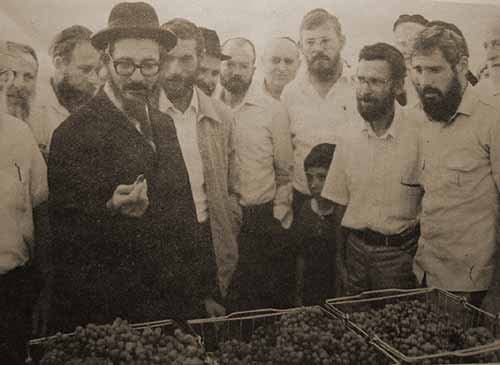|
THE
FOURTH YEAR IN MOSHAV MATITYAHU An article, written by the staff of "Olomeinu" magazine about Moshav Matityahu - the community of which Rabbi Leff is the Rabbi and has been for the past 17 years. |
|
If you use wine from Israel for the Arba Kosos (Four Cups) of your Seder, you may notice that the Kashrus certification on the bottle says that it is kosher for Passover and that the wine is not made from Revai or Orlah. What is that? The Torah Commands that for the first three ears of a tree of vine's life in Eretz Yisrael, its fruit may not be used for any purpose whatsoever. The fruit of those three years is called Orlah (closed up or forbidden). In the fourth year, the fruit is called Neta Revai (the fourth year planting). It has a special kind of holiness. In the time of the Bais Hamikdash, such fruit had to be brought to Jerusalem and eaten there. . Or, if it was too hard to bring all the fruit to Jerusalem, it could be redeemed for money and the money would be brought to Jerusalem. There, the owners would buy food with the money. Even though we have no Bais Hamikdash today, those two mitzovs are still observed in Eretz Yisrael. Fruits of the first three years are not used. Fourth year fruits are not eaten until they are redeemed wit a coin and ht e coin is destroyed. That is all we can do until the Bais Hamikdash is rebuilt. This has been a special year in Moshav Matityahu, A new settlement of Poale Agudath Israel, not far from Jerusalem; because this is the first time the town's settlers were able to make Pidyon Neta Revai (Redemption of the Fourth Year Planting). In Israel, Moshav means a settlement where all the people are equal partners in all the businesses, but they own their own homes and can have private possessions. Moshav Matityahu was founded four years ago in Modi'in, the place where the Chashmonaim began their revolt against the Syrian-Greeks. That's to the Chashmonaim, we had the miracle of Chanukah, so the Moshav in Modi'in was named Matityahu after the father and first leader of those brave tzddikim. Moshav Matityahu is a small but growing settlement. It ahs forty-six adults and a hundred children (kein yirbu), and a kerem (vineyard) that celebrated its fourth birthday this year. Before the Pidyon Neta Revai ceremony took place, there was a special Torah learning day for the Moshav. Late that day many rabbis from the area came and spoke. The Kedusha (holiness) of the grapes was then redeemed by transferring it to a coin. There was lively singing and dancing and fruits of Eretz Yisrael were served. During the summer months of the past three years, many of the moshav's children, whose families are olim (immigrants) from America and England, also helped in the planting of the kerem (vineyard). They did such jobs as tying up the vines and pulling out weeds. Some were luck enough to get tractor rides. Once in a while, when the kerem was just a "baby" some of he men even had to spend Shabbat there to prevent cows and donkeys from eating up the seedling. Some families
of the Moshav also make their own wine every year with grapes from
a neighboring settlement, which harvest from an older vineyard.
Children often help with this to, by picking the grapes and putting
them into large containers where they will ferment. Besides the
special taste of the wine, it is very exciting to drink your on
wine on Shabbat and Pesach knowing that you made it your self. And
as an extra plus, it has that extra Kedusha, which only Eretz Yisrael
produce can have. |


